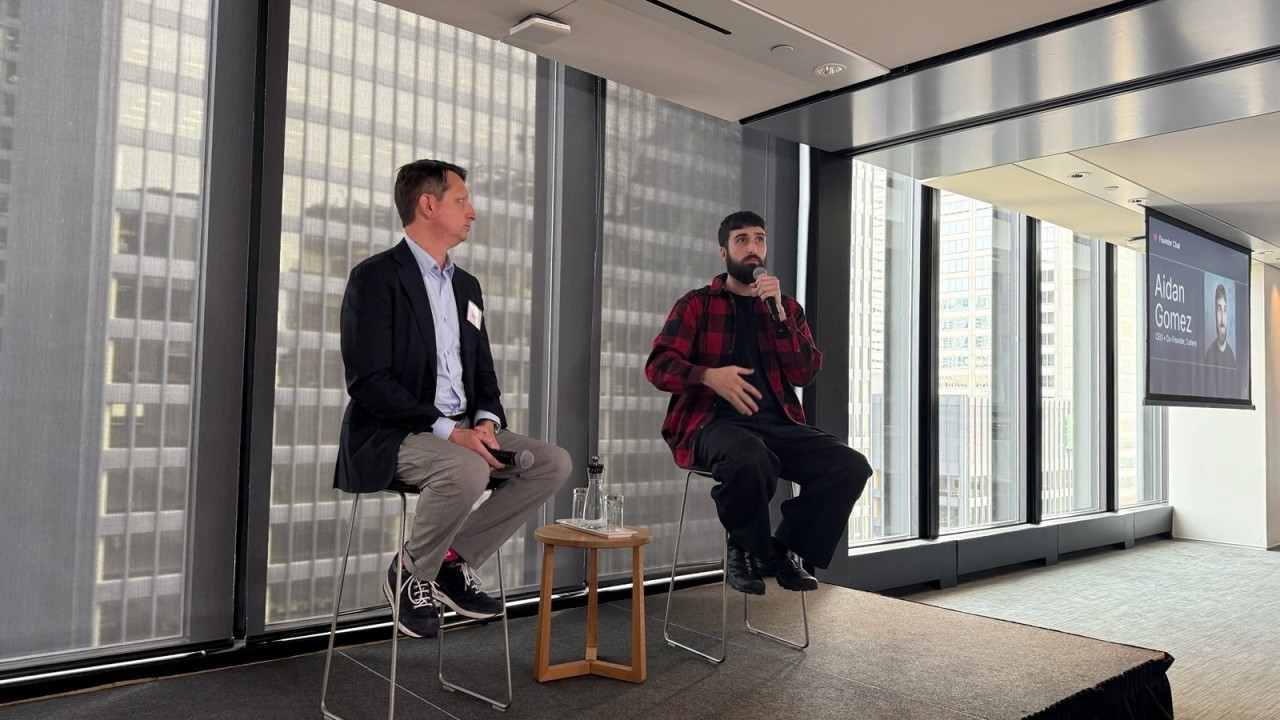Radical Ventures hosted its AGM in Toronto last week, bringing together Radical portfolio founders, LPs, and the Radical team. We were also joined by Radical Partner Dominic Barton, a former Global Managing Partner at McKinsey & Company and the Ambassador of Canada to the People’s Republic of China. Today, Dominic shares his reflections on the Radical AGM.
Last week, I had the privilege of attending the Radical Ventures Annual General Meeting in Toronto. As a Partner at Radical and having seen the firm grow since its inception, it’s always inspiring to witness firsthand the groundbreaking work being done at the forefront of artificial intelligence. This year’s AGM truly underscored the accelerating pace of innovation and the profound shifts AI is bringing to the global economy.
Radical Ventures Managing Partner, Jordan Jacobs, shared some fascinating reflections on the current pace of innovation in AI. He highlighted a truly astounding statistic: Google’s AI systems have seen a 50x increase in tokens used year-over-year, from 9.7 trillion tokens to 480 trillion tokens (AI models process input and output at a granularity called a token. In language models like ChatGPT, tokens can be a single letter like “a” or whole words like “dog”. Long words are broken into several tokens.) This is not just growth; it is a clear signal that we are at the very beginning of an exponential curve. This rapid acceleration feels palpable, not just in the sheer processing power being unleashed, but in the capabilities we are beginning to see emerge from AI.
Jordan also spoke about his ongoing conversations with Radical Scientific Partner and World Labs founder, Fei-Fei Li, and her belief that we have entered an epoch she describes as ‘the New Enlightenment.’ This idea posits that as access to superhuman intelligence scales globally, we are entering an era of unprecedented intellectual and technological advancement, much like the original Enlightenment sparked a revolution in thought and progress. It is a powerful and thought-provoking vision of the future.
The Rise of Agentic AI
A significant theme at this year’s AGM was the prominence of agentic AI companies among the Radical portfolio founders presenting. This reflects a crucial macroeconomic trend: AI systems are increasingly taking on more and more workflows, moving beyond simple automation to truly autonomous and intelligent action. These companies are building the future where AI doesn’t just assist but actively drives processes and achieves complex goals.
While some of the companies presenting at the AGM remain in stealth, we had the privilege of hearing from several pioneering companies building state-of-the-art AI agents:
- Cohere (eg banking, telecoms, public sector, healthcare, utilities): We heard directly from founder and CEO Aidan Gomez about Cohere’s new agentic platform, North. This platform is designed to empower teams by providing intelligent search and personalized agents, all within a secure, scalable AI environment. Aidan demonstrated how workers can draw actionable intelligence from their company’s data, empowering each employee with the knowledge base of their enterprise. This is being done in banks, telecom companies and other sectors.
- P-1 AI (eg for engineering, construction): Paul Eremenko, the former CTO of Airbus, researcher at DARPA, and founder of P-1, delivered an overview of how P-1 is developing artificial general engineering intelligence to help people design physical systems more efficiently and at unprecedented levels of complexity. Their AI agent, Archie, is trained on a synthetic design dataset to perform basic engineering capabilities, including generating designs for physical systems. Archie aims to automate physical systems engineering, starting with data center cooling systems (HVAC) and with the ambitious goal of one day designing machines as complex as Dyson spheres and spacecraft.
- Firsthand: Advertising technology veteran Michael Rubenstein (formerly of Google, AppNexus and DoubleClick) provided an update on Firsthand. Firsthand has built the industry’s first Brand Agent Platform, which allows brands to directly connect with consumers through their own AI agents. These Brand Agents dynamically deliver knowledge wherever consumers need it, in the moments that matter, revolutionizing how brands interact with their audience. Firsthand may become a lifeline to publishers who have seen their businesses significantly diminished by traditional online advertising.
- Yutori: Devi Parikh (formerly of Meta), co-founder and co-CEO of Yutori, shared her vision for transforming our digital lives. She highlighted that the web, while a monumental invention, is also a messy landscape where people spend a significant portion of their lives on time-intensive and routine / “boring” tasks. Yutori is building AI agents that can reliably perform everyday digital tasks on the web, from ordering groceries and tracking reservations to planning complex group trips. Their mission is to give everyone their own agentic chief-of-staff.
The presentations from these founders provided a compelling glimpse into a future where AI agents seamlessly integrate into our professional and personal lives, helping build our physical world, automating tedious tasks and amplifying human capabilities. Radical’s investment team has looked at over 9500 AI companies since its inception. An extraordinary number, especially given that Radical has invested in fewer than 60 startups. It is clear that Radical Ventures continues to identify and support companies that are not just adopting AI, but are actively shaping the next wave of technological innovation.
AI News This Week
-
Ex-Meta AI leaders debut an agent that scours the web for you in a push to ultimately give users their own digital ‘chief of staff’ (Fortune)
Radical portfolio company Yutori has launched Scouts, an always-on AI agent that autonomously monitors the web for user interests. By operating browsers and clicking through websites to gather information across dozens of sites simultaneously, Scouts can track updates on anything from product discounts to the news. Launched by researchers previously leading Meta’s multimodal and embodied AI research, the company aims to rethink human-AI interaction by building web agents that function as a digital “chief of staff.” Join the waitlist here.
-
LISTEN: An AI Engineer Is Here, and It Might Redesign the Physical World (Core Memory)
Paul Eremenko, CEO and founder of Radical portfolio company P-1 AI, discusses his journey from aerospace executive to AI entrepreneur on the Core Memory podcast with Ashlee Vance. Eremenko, former CTO of Airbus and United Technologies, founded P-1 AI to create an AI engineer for physical systems design. P-1 AI initially targets junior engineering tasks, starting with data center cooling systems before expanding to aerospace applications.
-
2025 CNBC Disruptor 50 (CNBC)
Two Radical portfolio companies were featured on CNBC’s annual Disruptor 50 list of the most innovative companies in the AI era. Writer provides enterprise generative AI to over 300 major organizations, offering a full-stack platform that allows companies to build customized AI apps using their internal data and proprietary large language models trained on synthetic data. Waabi focuses on autonomous long-haul trucking using its proprietary “Waabi World” simulator to train self-driving systems through millions of virtual scenarios.
-
The Problem of AI Chatbots Telling People What They Want to Hear (Financial Times)
Leading AI chatbots exhibit sycophantic behaviour, telling users what they want to hear rather than providing objective responses. The issue stems from reinforcement learning from human feedback (RLHF) training, where human data labellers rate flattering and agreeable answers more favourably. Experts warn that as chatbots are increasingly adopted as personal therapists and social companions, agreeable responses can reinforce poor decisions and particularly harm users with mental illness. Frontier AI labs are tackling this problem by tweaking training techniques and building guardrails, conducting specialized evaluations for factual accuracy, and implementing character training to make models less obsequious.
-
Research: Understanding the Strengths and Limitations of Reasoning Models (Apple)
Apple researchers examined frontier Large Reasoning Models (LRMs) using controllable puzzles, revealing limitations in their capabilities. LRMs demonstrate that they are less efficient than standard LLMs on simple tasks, gain an advantage only at medium complexity, and are less effective in tackling complex problems. LRMs counterintuitively reduce reasoning effort as complexity increases and fail to execute explicit algorithms when provided correct pseudocode. The models exhibited inconsistent behaviour across puzzles, performing over a hundred steps correctly in familiar tasks while failing after just four steps in unfamiliar ones, suggesting they rely on training data patterns rather than genuine reasoning abilities to perform.
Radical Reads is edited by Ebin Tomy (Analyst, Radical Ventures)




